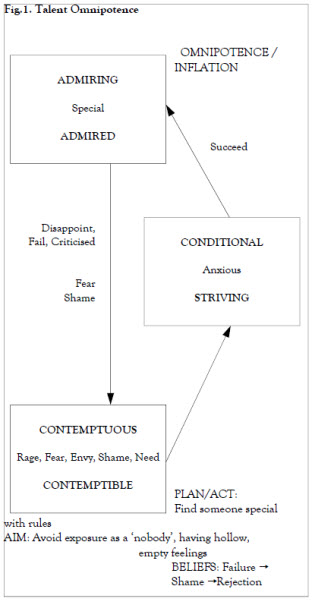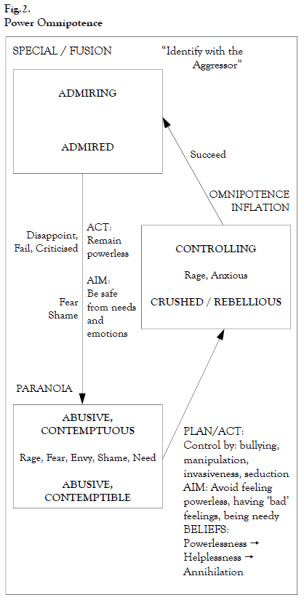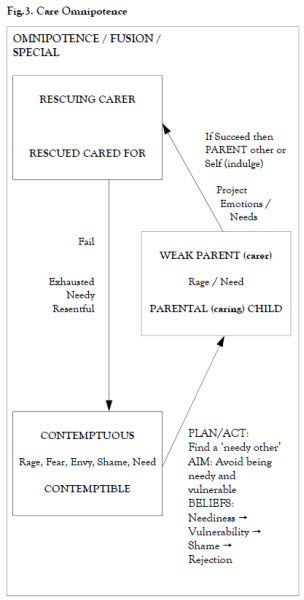Nacissism - A CAT Perspective
Tanner, C. and Webster, P., 2003. Nacissism - A CAT Perspective. Reformulation, Summer, pp.16-18.
Narcissism - A CAT Perspective
Claire Tanner and Peter Wester
Introduction
Cognitive Analytic Therapy has usefully defined partially dissociated self states where patients are fragmented between good and bad aspects of themselves and others. In this article we would like to describe intermediate self states that maintain this fragmentation as a way of not integrating the unmanageable feelings associated with the split. We have observed in our clinical practice with patients with eating disorders and personality disorders three categories of intermediate self states. These states have in common omnipotence as their aim, and are driven by different emphases of the core pain.
The Primary Narcissistic Split
The CAT concept of narcissism is the split between the reciprocal roles of admiring/admired and contemptuous/ contemptible. The admiring/admired self state, in which people feel they are special and gratified and admired by special others, carries the mood and function of omnipotence. Kernberg defines omnipotence in terms of entitlement and power over others, where others are used for homage and gratification within the narcissistic split. The inverse self state of the split is a profound devaluation of self and others, which in CAT is described as the contemptuous/contemptible state. The devaluation of the other is described by Kernberg ‘as a corollary of the omnipotence; if an external object can provide no further gratification or protection it is dropped and dismissed (p33 Borderline Conditions and Pathological Narcissism). This contemptuous devaluation, resulting in contemptibility, leads to profound feelings of worthlessness, failure, need, and vulnerability and is experienced as unbearable by the sufferer. In CAT these feelings are described as the ‘core pain’ of the state. For the sufferer, the only management of these feelings is to dissociate to the omnipotent position.

Intermediate States
We understand that, in order to achieve the omnipotent state, three intermediate states exist as separate self states between the contemptuous/contemptible and admiring/admired states. Which one exists will depend on the emphasis of feeling within the contemptuous/contemptible state.
Firstly is the ‘talent’ or conditional/striving state where the most unbearable feelings are linked to feeling a failure (see figure 1). In this state a set of conditions of excellence are set up by self or others where there are particular talents that provide gratification if excellence or perfection is achieved, thus resulting in feelings of power and mastery within an omnipotent state. The therapist will therefore be recruited either to provide conditions of excellence, or to strive towards the patient's conditions of excellence, where both are being the judge of each of other. In each dyad the person in the conditional role carries the judgement of success or failure. Gratification is linked to success and failure is linked to devaluation. The core pain triggered by failure is intolerable and rejection occurs.
The second state is that of ‘power’ or the reciprocal roles controlling/crushed which arise from the feelings of helplessness (see figure 2). In this intermediate state the feelings of helplessness are the most intolerable as they can be experienced as annihilation of the self. Thus the patient will aim to obtain power by any means possible over themselves and others. In our experience there are four main ways this is done: bullying of the other, manipulation, invasiveness and seduction. The recipient of these behaviours can either take the roles of being crushed and dominated or rebel in order to regain some control. When total control is achieved then the omnipotent state of power is also achieved, and the gratification is derived from an omnipotent fusion state with extreme dependency. The devaluation occurs when the fusion is broken, and the ‘controller’ experiences their own helplessness. For the therapist this can be experienced as either a power battle or gratification through the extreme dependency on them. Once the dependency re-exists then the gratification is back in place.
The third state is the ‘total care’ or ‘parental child/vulnerable, needy other' which arises from the feelings of fear of neediness and vulnerability (see figure 3). In this intermediate state, feelings of vulnerability are intolerable and the patient will aim to project vulnerability into others and either reject them or provide care and/or rescue.

When this state is present in a therapy, it can be as if there are two therapists in the room and a competition may arise. Or a third party is recruited to be cared for by the dyad of the therapist and the patient. The exhaustion and resentment experienced by the patient will often recruit the therapist into rescuing him/her, but the rescue attempt is defeated as the patient cannot then experience the vulnerability of needing rescue. There is always a feeling that the patient must do it for his/herself and not in partnership with the therapist. To be needy and emotional is to risk rejection and extreme feelings of deprivation.
Clinical Implications
Narcissistic patients are amongst the most difficult patients to treat for a number of reasons. Firstly, the desperate fear of the contemptuous/contemptible state and fear of exposure can lead to avoidance of the core pain which is neither addressed nor experienced within the therapy. The addictive nature of the gratification available in the special state and the devaluation felt when the gratification is not available often results in therapists being recruited to gratify or to be devalued. The former is a much more comfortable and safe role than the latter and thus is the most obvious potential collusion that can occur.
A therapist is strongly invited to collude with the patient in the omnipotent roles and avoid experiencing the devalued roles. Furthermore, due to the nature of therapy, the striving for healing, the therapist-patient power differential and the earnest care giving roles of the therapist can be mistaken for true therapy when really they are roles within this narcissistic set-up resulting in gratification for both patient and therapist.
The advantage in CAT of naming both the narcissistic split and the intermediate states that maintain it is that collusion can be recognised in terms of the transference/counter-transference and collaboration towards a new aim of ordinariness can be pursued.

The understanding of the struggle towards relatedness and away from gratification/devaluation helps both the patient and therapist manage the intolerable feelings of devaluation and avoid the seductions towards gratification, with the ultimate aim of constructing a new reciprocal role in realms of ‘good enough’ and attachment.
We feel that this struggle takes place by naming and understanding the intermediate states of conditional/striving, controlling/crushed-rebellious and parental child/vulnerable-needy other, which keep the omnipotent/devaluation states in place.
 Petition to NHS England - The Case for Funding Training in the NHS 2021
Alert!
Petition to NHS England - The Case for Funding Training in the NHS 2021
Alert!ACAT's online payment system has been updated - click for more information

Full Reference
Tanner, C. and Webster, P., 2003. Nacissism - A CAT Perspective. Reformulation, Summer, pp.16-18.Search the Bibliography
Type in your search terms. If you want to search for results that match ALL of your keywords you can list them with commas between them; e.g., "borderline,adolescent", which will bring back results that have BOTH keywords mentioned in the title or author data.
Related Articles
Differences Between Borderline and Narcissistic Personality Disorders
Ryle, A., 2002. Differences Between Borderline and Narcissistic Personality Disorders. Reformulation, Autumn, pp.16-17.
A Suggested New Diagrammatic Formulation for Narcissists
Nehmad, A., 2010. A Suggested New Diagrammatic Formulation for Narcissists. Reformulation, Winter, p.44.
Narcissism: From Kohut to CAT
Pollard, C., 1997. Narcissism: From Kohut to CAT. Reformulation, ACAT News Winter, p.x.
The Neurotic Neighbourhood
Elia, I., 2002. The Neurotic Neighbourhood. Reformulation, Autumn, pp.18-19.
CAT and Narcissism: The Missing Chapter
Nehmad, A., 1997. CAT and Narcissism: The Missing Chapter. Reformulation, ACAT News Winter, p.x.
Other Articles in the Same Issue
ACATnews: CPD Update
Buckley, M., 2003. ACATnews: CPD Update. Reformulation, Summer, p.12.
ACATnews: East Anglia and "CAT and Later Life"
Sutton, L., 2003. ACATnews: East Anglia and "CAT and Later Life". Reformulation, Summer, p.11.
ACATnews: Scotland
Gray, M., 2003. ACATnews: Scotland. Reformulation, Summer, p.11.
Book Review: 'Language for those who have nothing. Mikhail Bakhtin and the Landscape of Psychiatry' Peter Good (2001)
Pollard, R., 2003. Book Review: 'Language for those who have nothing. Mikhail Bakhtin and the Landscape of Psychiatry' Peter Good (2001). Reformulation, Summer, pp.40-43.
Editorial
Scott Stewart, M., Nuttall, S.,, 2003. Editorial. Reformulation, Summer, p.3.
Letters to the Editors: Consciousness & The War
Dunn, M., 2003. Letters to the Editors: Consciousness & The War. Reformulation, Summer, pp.4-5.
Letters to the Editors: Mindfulness
Clark, J., 2003. Letters to the Editors: Mindfulness. Reformulation, Summer, pp.8-9.
Letters to the Editors: New, Modern, Dependable?!
Welch, L., 2003. Letters to the Editors: New, Modern, Dependable?!. Reformulation, Summer, pp.9-10.
Letters to the Editors: On the War
Dunn, S., 2003. Letters to the Editors: On the War. Reformulation, Summer, pp.5-6.
Letters to the Editors: Pausing for Breath, Personal Reflections on the War
Wilde McCormick, E., 2003. Letters to the Editors: Pausing for Breath, Personal Reflections on the War. Reformulation, Summer, pp.6-8.
Letters to the Editors: The War in Iraq
Dunn, M., 2003. Letters to the Editors: The War in Iraq. Reformulation, Summer, p.6.
Letters to the Editors: War and CAT
Benninck Bolt, F., 2003. Letters to the Editors: War and CAT. Reformulation, Summer, p.4.
Nacissism - A CAT Perspective
Tanner, C. and Webster, P., 2003. Nacissism - A CAT Perspective. Reformulation, Summer, pp.16-18.
Psychoanalytic Theories of Perversion Reformulated
Wood, H., 2003. Psychoanalytic Theories of Perversion Reformulated. Reformulation, Summer, pp.26-31.
Reciprocal Roles and the 'Unspeakable Known': Exploring CAT within Services for People with Learning Disabilities
Lloyd, J. and Williams, B., 2003. Reciprocal Roles and the 'Unspeakable Known': Exploring CAT within Services for People with Learning Disabilities. Reformulation, Summer, pp.19-25.
Two different presentations with Borderline Personality Disorder
Fawkes, L. and Fretten, V., 2003. Two different presentations with Borderline Personality Disorder. Reformulation, Summer, pp.32-39.
Working With Shame
Gilbert, P., 2003. Working With Shame. Reformulation, Summer, pp.13-15.
Help
This site has recently been updated to be Mobile Friendly. We are working through the pages to check everything is working properly. If you spot a problem please email support@acat.me.uk and we'll look into it. Thank you.
